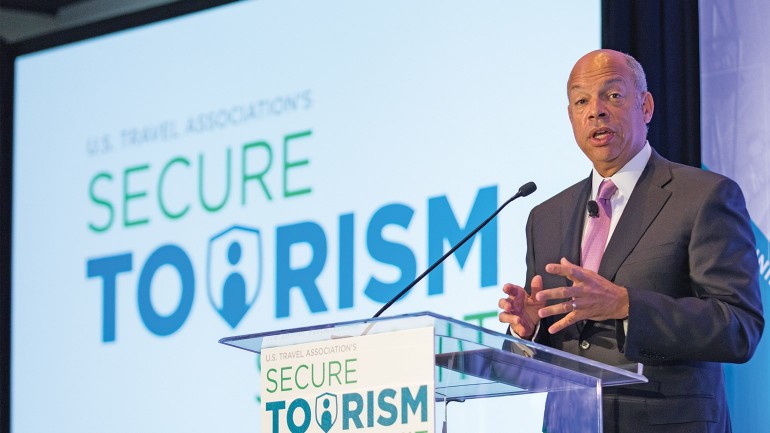Sponsored Listings:
NEW YORK — Travel destinations and venues must practice and prepare for potential terror attacks, active shooters and natural disasters, according to security experts who spoke at the U.S. Travel Association’s inaugural Secure Tourism Summit here last week.
“The more you practice and plan, the better you’ll anticipate the next crisis,” said Frances Townsend, former assistant to President George W. Bush for homeland security and counterterrorism.
The best preparations, the experts said, include training exercises, public-private coordination and consistent messaging.
“The U.S. government and state and local law enforcement cannot be everywhere all the time,” said Jeh Johnson, the former secretary of homeland security under President Obama. “So homeland security — hometown security — has to be a matter of public-private partnerships.”
Johnson was one of several speakers who urged airports, sporting venues, destinations and any other tourism entities to ask local authorities to help prepare them for crises.
Dave LaPorte, senior vice president of airport operations at Denver Airport, said that in the past, the airport police were responsible for public safety, and the TSA was responsible for security.
“We are now one team,” he said. “We meet once a week. We exercise together. We get security briefings for the whole leadership team.”
The industry needs to prepare not only for disasters but for policy shifts, such as the current electronics ban, which prohibits flyers from 10 airports in the Middle East and North Africa from carrying laptops in carry-ons. “If I were in the airline or tourism business, I’d say, ‘What do I do if that is expanded?'” Townsend said. “What if it’s more than 10? What if it applies to U.S. domestic flights? … Ask yourself what may happen next.”
In a telling indicator of the need to improve messaging in the event of a crisis, 48% of respondents in an audience poll said that in the past five years, their organization had faced an emergency or crisis that they believe was mishandled from a communications or reputation standpoint.
Ari Fleischer, former White House press secretary under President George W. Bush, told the audience that in the event of a crisis, before talking to the press, local officials need to establish the facts and think like a reporter in terms of considering the toughest questions that will be asked. When the time comes, they must maintain discipline.
“Define your message,” he said. “If you owned the newspaper that was covering the session, what headline would you put on the story? Do drills with your staff to get that headline.”
A few panelists pointed out that tourists are often forgotten in the event of a disaster. Lori Pennington-Gray, director of the University of Florida’s Tourism Crisis Management Institute, said via video that this is a common “weak spot” when it comes to disaster and crisis response.
“Tourists are different because they may speak a different language, they are not familiar with their surroundings,” she said.
Communities need to do better at being “ambassadors of safety” for travelers, and putting policies and procedures in place making “visitors a first priority.”
Hotels and other tourism entities can do that, she said, by coordinating with the right experts and making sure there is a consistent message given to their guests.
The panelists also talked about the challenge of letting tourists know that their destination is prepared for disaster without calling attention to possible risks.
“We want to instill confidence in people,” said Fred Dixon, CEO of NYC & Company. “People do take security into consideration when they choose a destination. … An increased focus on security is something we feel is a good idea to communicate. We do not shy away from talking about our counterterrorism task force.”
Jorge Costa, senior vice president of operations for the San Francisco Giants, was of the same mind, acknowledging that Major League Baseball stadiums had shied away from security at first out of concern that it would scare away the fans.
“If you build it, they will come,” he said of large sports venues. “But if they don’t feel safe, they will leave.”
Sоurсе: travelweekly.com










